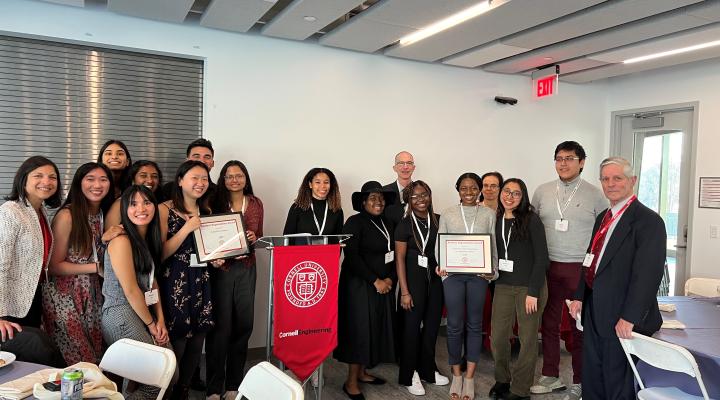New transportation technologies of the past decade, such as ride-sharing and self-driving cars, are transforming how people get around—powered in part by artificial intelligence, the widespread adoption of mobile phones, and new business models. It remains unclear, however, whether these innovations alone can lead us toward a future that is sustainable and equitable.
 With this CAREER award, Samitha Samaranayake, Civil and Environmental Engineering, is developing algorithms and computational models to support the design and operation of transportation systems that are efficient, sustainable, and equitable for all. This project pursues the idea that these objectives are best achieved by transit systems that are hybrid—seamlessly integrating the efficiencies of mass transit with agile, demand-responsive services such as ride-sharing. Goals include 1) quantifying the value of integrating demand-responsive systems with mass transit; 2) developing new models and algorithms for hybrid transit network design; 3) incorporating pricing and social welfare analysis into hybrid network design to anticipate the effects that design decisions and policy decisions, such as subsidies, will have on equity and other societal goals; and 4) developing fast, scalable, passenger-matching and routing algorithms for the demand-responsive component of hybrid transit systems.
With this CAREER award, Samitha Samaranayake, Civil and Environmental Engineering, is developing algorithms and computational models to support the design and operation of transportation systems that are efficient, sustainable, and equitable for all. This project pursues the idea that these objectives are best achieved by transit systems that are hybrid—seamlessly integrating the efficiencies of mass transit with agile, demand-responsive services such as ride-sharing. Goals include 1) quantifying the value of integrating demand-responsive systems with mass transit; 2) developing new models and algorithms for hybrid transit network design; 3) incorporating pricing and social welfare analysis into hybrid network design to anticipate the effects that design decisions and policy decisions, such as subsidies, will have on equity and other societal goals; and 4) developing fast, scalable, passenger-matching and routing algorithms for the demand-responsive component of hybrid transit systems.
At a moment of renewed national focus on transit infrastructure, this project supports the development of innovative transportation service models. Engaging with a wide range of stakeholders—such as transit agencies, technology providers, community groups, and policymakers—will allow researchers to develop an understanding of practical and societal needs, calibrate models using real data, and validate models through simulation and deployments.
Funding Received: $598 Thousand spanning 5 years
Cornell Research article link




 With this CAREER award, Samitha Samaranayake, Civil and Environmental Engineering, is developing algorithms and computational models to support the design and operation of transportation systems that are efficient, sustainable, and equitable for all. This project pursues the idea that these objectives are best achieved by transit systems that are hybrid—seamlessly integrating the efficiencies of mass transit with agile, demand-responsive services such as ride-sharing. Goals include 1) quantifying the value of integrating demand-responsive systems with mass transit; 2) developing new models and algorithms for hybrid transit network design; 3) incorporating pricing and social welfare analysis into hybrid network design to anticipate the effects that design decisions and policy decisions, such as subsidies, will have on equity and other societal goals; and 4) developing fast, scalable, passenger-matching and routing algorithms for the demand-responsive component of hybrid transit systems.
With this CAREER award, Samitha Samaranayake, Civil and Environmental Engineering, is developing algorithms and computational models to support the design and operation of transportation systems that are efficient, sustainable, and equitable for all. This project pursues the idea that these objectives are best achieved by transit systems that are hybrid—seamlessly integrating the efficiencies of mass transit with agile, demand-responsive services such as ride-sharing. Goals include 1) quantifying the value of integrating demand-responsive systems with mass transit; 2) developing new models and algorithms for hybrid transit network design; 3) incorporating pricing and social welfare analysis into hybrid network design to anticipate the effects that design decisions and policy decisions, such as subsidies, will have on equity and other societal goals; and 4) developing fast, scalable, passenger-matching and routing algorithms for the demand-responsive component of hybrid transit systems.